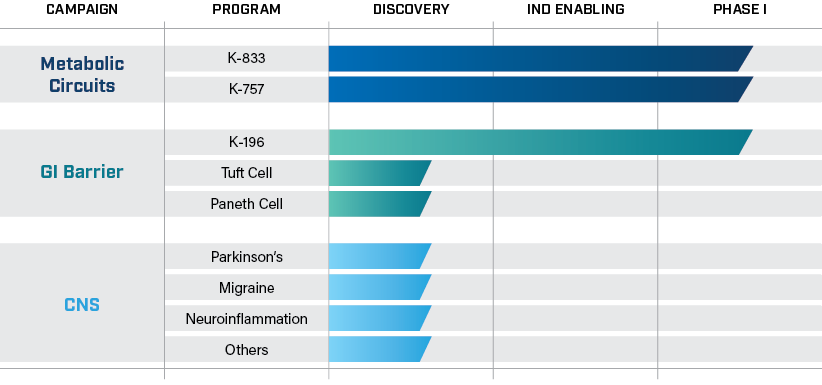 New York City-based Kallyope is one of the few biotechs focused solely on the gut-brain axis.
New York City-based Kallyope is one of the few biotechs focused solely on the gut-brain axis.
The privately-held company has built a cross-disciplinary team that weaves together advanced technologies in sequencing, bioinformatics, neural imaging, human genetics, and cellular and molecular biology to interrogate the hormonal and neural signaling pathways that comprise the gut-brain axis.
The company has raised $479 million to date, including a $236 million Series D financing in February.

Jay Galeota
The president and CEO of the company is Jay Galeota, who worked at Merck & Co. (NYSE:MRK) for almost three decades.
“I was fortunate enough to lead the team that brought Merck into diabetes with Januvia (sitagliptin) and Janumet (sitagliptin/metformin),” Galeota said. Last year, the drugs generated $5.3 billion in revenue.
The discoverers of sitagliptin, Nancy Thornberry and Ann Weber, are both Merck alumni who are now senior executives at Kallyope. Thornberry was the founding CEO of the biotech and currently serves as chair of R&D, while Weber is a senior vice president of preclinical development.
A wet-lab-equipped office in Manhattan
The focus on science was part of what drew Galeota in. “When you come off the elevator on our floor in this tower in New York City, you think you’re in an academic wet lab,” Galeota said. “You see all around hoods and the equipment and everything. Almost 90% of our employees are scientists, which is super exciting.”
Galeota said the company is a “lab as much as we are a biopharma company.”
Kallyope has explored using novel biology and basic science to unlock previously unknown neural signaling pathways between the gastrointestinal (GI) tract and the brain.
The goal is to map the neural and hormonal signaling pathways between the GI tract and the brain to learn how to elicit systemic responses that have a therapeutic effect. “Based on this work, the targets were identified and validated,” Galeota said.
Kallyope’s pipeline
The company is now focusing in three distinct therapeutic areas.
The first area focuses on metabolism and metabolic circuits. “That is specifically in diabetes and obesity, but also other related conditions,” Galeota explained. “We have compounds in the clinic in that area, and we have follow-on compounds that are in development.”

[Image courtesy of Kallyope]
The company’s neurobiology franchise spans multiple disease areas. “We’ve got a lead program in migraine that we’re super excited about,” Galeota said. “Our chief medical officer led the early clinical development of two migraine programs at Merck. Then we’ve got several follow-on compounds in other areas like Parkinson’s disease and neuroinflammation.”
In the long run, the company sees many other potential diseases its pipeline could address, including conditions ranging from food allergy and celiac disease to rare diseases.
Filed Under: clinical trials, Drug Discovery, Gastroenterology, Metabolic disease/endicrinology, Psychiatric/psychotropic drugs





Tell Us What You Think!
You must be logged in to post a comment.